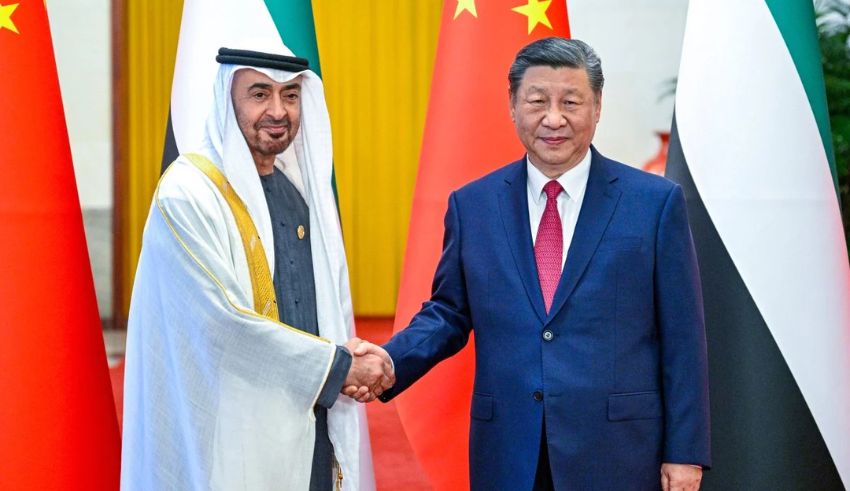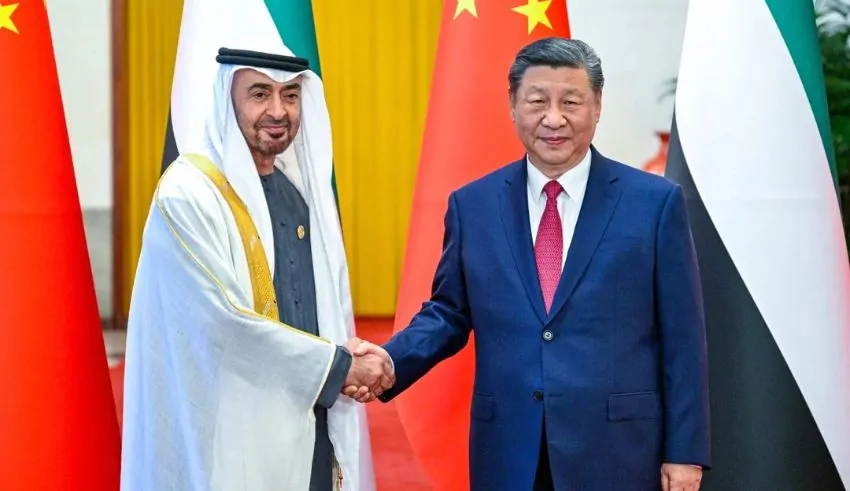

(C) Middle East Policy Council
The United Arab Emirates (UAE) and China have developed a complex and multifarious relationship spanning much beyond conventional diplomatic relationships over the past four decades. From economic and defense cooperation to cultural interactions and multilateral alliances, the China-UAE alliance shows a convergence of strategic goals and mutual interests. Formally started on November 1, 1984, when the two nations developed diplomatic ties, this cooperation has evolved into one of the most active international ties in the Middle East.
It is clear from both nations marking the 40th anniversary of their diplomatic connections that their alliance is growing over new frontiers, therefore improving not only their bilateral situation but also their profile as major participants in the larger geopolitical scene.
China opened its embassy in Abu Dhabi in April 1985, followed by the UAE building its embassy in Beijing in March 1987, hence starting the diplomatic history between China and the UAE. These actions were the first interaction between the two countries, but the high-level visits really hastened the strengthening of their ties.
The first occurrence of a Chinese head of state visiting the UAE was that of Yang Shangkun in 1989. This historic event prepared the way for later cooperation. One year later, in 1990, Sheikh Zayed bin Sultan Al Nahyan, the first president of the United Arab Emirates and founding father, paid a visit to China among the first leaders from an Arab Gulf state. His visit to Beijing marked the rising relevance of China-UAE ties in the larger framework of Asia and the Arab Gulf.
High-level exchanges have formed pillars of the partnership since these first trips. Especially, the 2018 visit of Chinese President Xi Jinping to the UAE improved the rapport to a “comprehensive strategic partnership,” the highest degree of diplomatic interaction. This update emphasizes the two countries’ same interests and alignment, therefore strengthening their position as world allies. Under UAE President Sheikh Mohammed bin Zayed Al Nahyan, who has visited China several times, most recently in May 2024, the friendship keeps flourishing. Referring to China as his “second home,” Sheikh Mohammed stressed his close ties to the country during this visit; President Xi praised the bilateral relationship as a “model” for world diplomacy.
On important national and international concerns, China and the UAE have always stood by one other. The UAE’s relentless backing of China’s “One China” policy, which opposes any kind of Taiwanese independence and supports peaceful reunification under Beijing’s terms, is among the most obvious cases of this alignment. This posture captures the UAE’s long-term diplomatic approach and its respect to China’s fundamental territorial issues.
Conversely, China has given the UAE indirect support in its territorial conflict with Iran over three strategically placed islands in the Persian Gulf: Lesser Tunb, Greater Tunb, and Abu Musa. China has no direct involvement in this territorial dispute, but its demand for a peaceful resolution has matched UAE posture, hence strengthening relations with Gulf Cooperation Council (GCC) nations. China’s position on the conflict has been underlined in several venues, including the China-GCC summit and the China-Arab States Cooperation Forum, which has Iran reacting carefully.
China’s careful handling of the UAE-Iran territorial dispute emphasizes its more general diplomatic approach: helping its Gulf allies without offending Iran, a major strategic ally. This diplomatic balancing act shows China’s skill in negotiating the Middle Eastern difficult geopolitical terrain.
With notable increases in defense cooperation, the China-UAE partnership has also ventured into uncharted ground. With their first-ever combined air exercise, “Falcon Shield,” scheduled for August 2023, the two nations have started hitherto unheard-of military collaboration in recent years. The second round of these air drills, which took place in July 2024, indicates that such military drills are destined to be a regular occurrence of their defense alliance.
The UAE’s acquisition of China’s L-15, a light attack aircraft, shows even more its openness to vary its defense procurement outside conventional Western allies. This choice also emphasizes the growing defense coordination between the two countries. Furthermore highlighting the changing nature of UAE military strategy is its desire in acquiring China’s J-20 stealth fighter in spite of delays in its acquisition of 50 F-35 aircraft from the United States.
Military cooperation between China and the United Arab Emirates goes beyond mere arms purchases. Defense talks, training exchanges, and technology transfers—all of which point to a development of their strategic military relationship—have been undertaken by the two nations.
Grand symbolic actions highlighting the importance of China’s and UAE’s relationship have often enhanced diplomatic ties between the two countries. The Emirati government spared no effort in greeting President Xi when he visited the UAE in 2018. Among the ways the UAE showed its goodwill were a 21-gun salute, a state banquet, and projecting Xi’s image on the 65-story Adnoc Headquarters in Abu Dhabi. A mobile network was also christened “Welcome Pres China,” and Xi received the highest civilian accolade in the UAE—the “Order of Zayed.”
These large-scale actions convey the great regard and value both nations attach to their relationship, not only ceremonial. With the UAE lighting the Burj Khalifa, the tallest skyscraper in the world, to celebrate Chinese holidays including the Lunar New Year and Mid-Autumn Festival, the cultural diplomacy between the two countries has also blossomed. These exhibits attest to the developing cultural link between the two nations.
China-UAE cultural ties now revolve mostly on education. Over 71,000 students amongst 171 institutions have registered to study Chinese since the UAE started a Chinese language initiative in 2019. The UAE’s awareness of China’s increasing worldwide impact and the need of raising future generations proficient in the language and habits of one of the biggest economies reflects this growing curiosity in Chinese culture and language.
Long the cornerstone of the China-UAE relationship is trade. With non-oil commerce making US$80.6 billion—a 12% rise from the year before—bilateral trade between the two countries reached about US$95 billion in 2023. Since diplomatic ties were established in 1984, this development highlights the explosive expansion of economic relationships—an 800-fold increase.
Both nations have lofty targets to boost trade to US$200 billion by 2030, and current trends point to them being well on their way to reach them. China is the main economic partner of the UAE in the Middle East; since it joined the Belt and Road Initiative (BRI), the UAE has grown to be a vital hub for China. Further underlining its importance in China’s multilateral trade and investment systems is the UAE’s founding membership in the China-led Asian Infrastructure Investment Bank (AIIB) and full membership in BRICS in 2024.
For sixty percent of China’s trade in the UAE, the UAE acts as a major transit hub. Its strategic location as a financial and logistical center has made it a crucial friend in China’s economic growth into the Middle East. China provides sophisticated infrastructure development, technological knowledge, and renewable energy know-how that fit UAE aim of economic diversification, hence this cooperation is mutually beneficial.
Under changing global power dynamics, the China-UAE cooperation has flourished. China has found in the UAE a consistent, investment-friendly climate with political stability and economic possibilities while it deals with tariffs, sanctions, and technological restrictions from the United States and its Western allies. From artificial intelligence and digital technology to banking and renewable energy, this confluence of interests has let both nations negotiate world uncertainty and investigate new avenues of cooperation.
Even although China is becoming more and more important in the UAE, the latter keeps a cautious approach to foreign policy. Historically a close friend of the United States, the UAE has shown signs of still valuing this strategic alliance in recent times. The UAE’s state-owned G42 company sold Chinese technology companies in April 2024 and struck a US$1.5 billion contract with Microsoft, therefore indicating its ongoing interaction with the US IT sector. Moreover, the US labeled the UAE as a “major defense partner” during Sheikh Mohammed’s visit to Washington in September 2024, thereby improving military relations and opening the path for more weapons deals—including maybe a renewal of negotiations on the F-35 fighter planes.
Although some observers believe these changes could reduce China’s influence, others contend the China-UAE connection will keep growing especially in the private sector. Based on its pragmatic approach to foreign policy, the UAE seems to be likely to keep a balanced relationship with both China and the United States, optimizing the chances each brings.
Celebrating 40 years of diplomatic ties, China and the United Arab Emirates’ relationship has soared. From modest diplomatic ties to a complete strategic cooperation spanning trade, defense, culture, and technology, the relationship has evolved. With common objectives in economic progress, technological innovation, and geopolitical stability, both countries are positioned to keep extending their partnership.
Looking ahead, the China-UAE partnership is likely to be even more important in determining the course of the Middle East and Asia. Whether via high-level diplomatic interactions, economic cooperation, or cultural exchanges, China’s and the UAE’s alliance is a shining example of world unity—one that will surely keep growing in the next decades.
Indeed, it is, and it marks a milestone in medical research as it transpired that doctors in China successfully transplanted…
Many fans and industry professionals saw Prithviraj Sukumaran's L2 Empuraan movie release on Thursday as a mixed success that gained…
Filipina teenager Alexandra Eala, 19 year old girl has achieved one of the biggest milestones in WTA season by defeating…
After waiting for a solid six years, Marvel Studios has divulged its next Avengers movie—Avengers: Doomsday. And the cast is…
Through software update Nothing OS 3.1 the company improves functionality of Phone (3a) and Phone (3a) Pro models. Global service…
China's electric vehicle (EV) giant BYD has officially taken over the global EV market, with a whopping revenue of 777…
This website uses cookies.
Read More